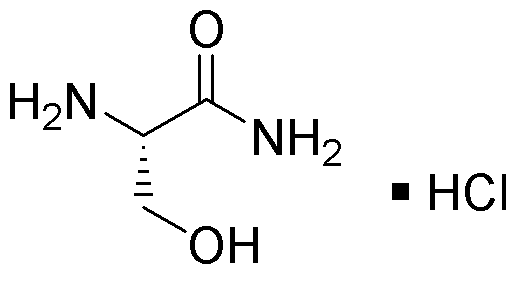L-Serine amide hydrochloride is widely utilized in research focused on:
- Neuroscience Research: This compound plays a crucial role in studying neurotransmitter synthesis and neuronal signaling, helping researchers understand brain function and disorders.
- Protein Synthesis: It serves as a building block in the synthesis of proteins, making it valuable in biochemistry and molecular biology studies aimed at developing new therapeutic proteins.
- Pharmaceutical Development: L-Serine amide hydrochloride is used in drug formulation processes, particularly in creating compounds that target neurological diseases, enhancing drug efficacy.
- Cell Culture Applications: This chemical is often added to cell culture media to support the growth and maintenance of various cell lines, crucial for biotechnological and pharmaceutical research.
- Metabolic Studies: It aids in metabolic pathway analysis, allowing researchers to investigate the role of amino acids in metabolism and their implications in health and disease.
General Information
Properties
Safety and Regulations
Applications
L-Serine amide hydrochloride is widely utilized in research focused on:
- Neuroscience Research: This compound plays a crucial role in studying neurotransmitter synthesis and neuronal signaling, helping researchers understand brain function and disorders.
- Protein Synthesis: It serves as a building block in the synthesis of proteins, making it valuable in biochemistry and molecular biology studies aimed at developing new therapeutic proteins.
- Pharmaceutical Development: L-Serine amide hydrochloride is used in drug formulation processes, particularly in creating compounds that target neurological diseases, enhancing drug efficacy.
- Cell Culture Applications: This chemical is often added to cell culture media to support the growth and maintenance of various cell lines, crucial for biotechnological and pharmaceutical research.
- Metabolic Studies: It aids in metabolic pathway analysis, allowing researchers to investigate the role of amino acids in metabolism and their implications in health and disease.
Documents
Safety Data Sheets (SDS)
The SDS provides comprehensive safety information on handling, storage, and disposal of the product.
Product Specification (PS)
The PS provides a comprehensive breakdown of the product’s properties, including chemical composition, physical state, purity, and storage requirements. It also details acceptable quality ranges and the product's intended applications.
Certificates of Analysis (COA)
Search for Certificates of Analysis (COA) by entering the products Lot Number. Lot and Batch Numbers can be found on a product’s label following the words ‘Lot’ or ‘Batch’.
Numéro de catalogue
Numéro de lot/série
Certificates Of Origin (COO)
This COO confirms the country where the product was manufactured, and also details the materials and components used in it and whether it is derived from natural, synthetic, or other specific sources. This certificate may be required for customs, trade, and regulatory compliance.
Numéro de catalogue
Numéro de lot/série
Safety Data Sheets (SDS)
The SDS provides comprehensive safety information on handling, storage, and disposal of the product.
DownloadProduct Specification (PS)
The PS provides a comprehensive breakdown of the product’s properties, including chemical composition, physical state, purity, and storage requirements. It also details acceptable quality ranges and the product's intended applications.
DownloadCertificates of Analysis (COA)
Search for Certificates of Analysis (COA) by entering the products Lot Number. Lot and Batch Numbers can be found on a product’s label following the words ‘Lot’ or ‘Batch’.
Numéro de catalogue
Numéro de lot/série
Certificates Of Origin (COO)
This COO confirms the country where the product was manufactured, and also details the materials and components used in it and whether it is derived from natural, synthetic, or other specific sources. This certificate may be required for customs, trade, and regulatory compliance.


